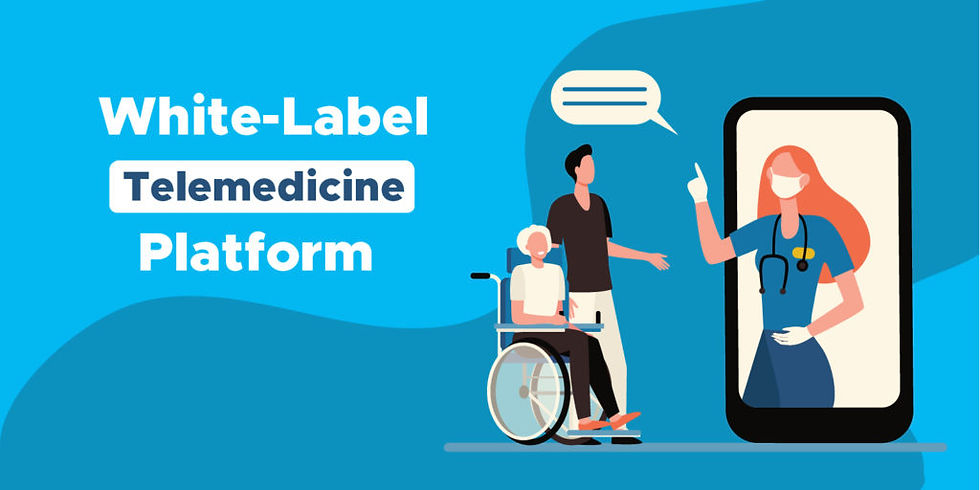Top 10 Telehealth Platforms Revolutionizing Healthcare in 2025
- helpdeskvcdoctor
- Jan 21, 2025
- 3 min read
Updated: Mar 27, 2025
Telehealth platforms are transforming healthcare, offering patients and providers unprecedented convenience, efficiency, and accessibility. In 2025, these platforms have become critical tools for delivering quality medical care, including virtual consultations, remote patient monitoring, and integrated healthcare solutions. Here, we’ll explore the top 10 telehealth platforms revolutionizing healthcare and their impact on the industry.

What Makes a Telehealth Platform Stand Out?
When evaluating telehealth platforms, several factors contribute to their success:
HIPAA compliance to protect patient privacy.
Ease of use for both patients and providers.
Integration with EHR systems for seamless data management.
Versatility in addressing diverse medical needs, from urgent care to chronic condition management.
Let’s dive into the top 10 telehealth platforms leading the charge in 2025.
1. VCDoctor
Overview: VCDoctor is a comprehensive telemedicine software provider that offers customizable, HIPAA-compliant solutions. Designed for clinics, hospitals, and solo practitioners, VCDoctor focuses on delivering patient-centric care through:
Secure video consultations.
Appointment scheduling and e-prescriptions.
Integration with EHR systems for efficient data management.
Impact: VCDoctor enhances accessibility, supports chronic care management, and reduces the need for in-person visits, ensuring better outcomes for patients and providers.
2. Amwell
Overview: Amwell is a leading telehealth platform offering solutions for urgent care, behavioral health, and specialty consultations. Its robust technology integrates with major insurance providers and EHR systems.
Key Features:
Multi-specialty telehealth services.
Scalable solutions for enterprises and small practices.
Advanced patient engagement tools.
Market Share: Holding a 13.16% market share, Amwell continues to be a trusted name among telemedicine software providers.
3. Doxy.me
Overview: Doxy.me provides a free, browser-based telehealth platform that is simple and accessible for providers of all sizes. Its focus on HIPAA compliance ensures secure patient communication.
Why It Stands Out:
No downloads required.
Easy-to-use interface for patients and doctors.
Reliable video and audio quality.
4. Cisco Systems
Overview: Known for its secure communication technology, Cisco Systems has carved a niche in the telehealth sector by offering highly reliable and scalable solutions.
Key Features:
End-to-end encryption.
Integration with healthcare-specific tools.
Flexible deployment options for clinics and hospitals.
5. Teladoc Health
Overview: Teladoc Health specializes in general medical, mental health, and chronic condition management. Its global reach makes it a leading telemedicine software provider.
Impact: Teladoc enables timely and efficient patient care, especially for remote and underserved populations.
6. Poly
Overview: Poly focuses on delivering high-quality video and audio solutions tailored for telehealth. Its technology enhances the patient-provider experience by ensuring clear and uninterrupted communication.
7. Philips Healthcare
Overview: Philips integrates telehealth platforms with medical devices, enabling remote patient monitoring and chronic care management. Its solutions are ideal for managing complex health conditions.
8. Microsoft Corporation
Overview: Leveraging its cloud-based tools, Microsoft offers telehealth solutions that seamlessly integrate with healthcare systems.
Key Strengths:
Secure data storage and management.
Collaboration tools for healthcare teams.
9. Vidyo
Overview: Vidyo provides scalable telehealth platforms that integrate with existing healthcare infrastructure, offering reliable video communication for consultations and team collaboration.
10. Proprietary Software Solutions
Overview: Many healthcare providers develop custom telehealth platforms to meet their specific needs. These solutions are tailored to offer advanced features such as:
Customizable workflows.
Specialized patient engagement tools.
Integration with unique EHR systems.
Why Telehealth Platforms Matter in 2025
Telehealth platforms are more than just virtual consultation tools. They play a pivotal role in addressing challenges like:
Improving access to care for rural and underserved populations.
Reducing healthcare costs by minimizing unnecessary in-person visits.
Streamlining workflows for providers through integrated solutions.
By incorporating tools like CPT code 99205 for complex visits or 99214 CPT code for follow-ups,
these platforms enable precise billing and coding, ensuring compliance and efficiency.
Conclusion
Telehealth platforms are revolutionizing the way healthcare is delivered, making it more accessible, efficient, and patient-focused. From VCDoctor’s customizable solutions to Philips’ integration with medical devices, each platform offers unique benefits tailored to the evolving needs of providers and patients.
As we continue into 2025, the role of telehealth platforms will only grow, supported by advancements in technology and increased adoption of virtual care. Choose a platform that aligns with your healthcare goals, and embrace the future of medicine.








Comments